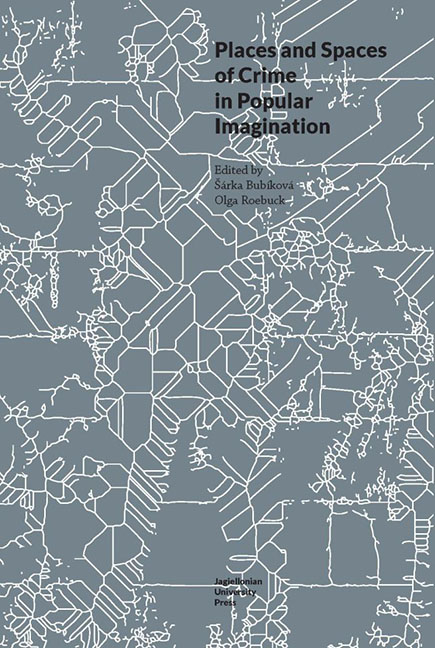Book contents
- Frontmatter
- Contents
- Introduction
- London in the Cormoran Strike Series
- London as the Murderer’s Playground in Sharon Bolton’s Now You See Me
- Through the Looking-Glass: Space and Place in Simon Mawer’s The Girl Who Fell from the Sky
- Murderous Academics: Territoriality in Cynthia Kuhn’s Academic Mysteries
- Suburbia and the Subversion of Its Values in 1950s Crime Comics
- Wilderness in Dana Stabenow’s and Nevada Barr’s Crime Fiction Series
- “I Am the Wave that Sinks into the Ocean”: The Sense of Place in The Affair
- Index
- Notes on the Contributors
Wilderness in Dana Stabenow’s and Nevada Barr’s Crime Fiction Series
Published online by Cambridge University Press: 13 October 2023
- Frontmatter
- Contents
- Introduction
- London in the Cormoran Strike Series
- London as the Murderer’s Playground in Sharon Bolton’s Now You See Me
- Through the Looking-Glass: Space and Place in Simon Mawer’s The Girl Who Fell from the Sky
- Murderous Academics: Territoriality in Cynthia Kuhn’s Academic Mysteries
- Suburbia and the Subversion of Its Values in 1950s Crime Comics
- Wilderness in Dana Stabenow’s and Nevada Barr’s Crime Fiction Series
- “I Am the Wave that Sinks into the Ocean”: The Sense of Place in The Affair
- Index
- Notes on the Contributors
Summary
In a 1982 article John Dean argued that in American literature the genre of science fiction alone “has retained the wilderness as a viable, constant preoccupation for a general, intelligent reading audience” (Dean 1982: 68). And while “the wilderness theme has otherwise steadily diminished” in post-WWII American literature, Dean claims that science fiction “has kept alive the wilderness geography of physical challenge, emotional wonder, spiritual hope, and the exploration of the unknown” (ibid.). This chapter will argue that the theme of wilderness has recently appeared, albeit not extensively, in works of another genre of popular literature, namely in crime fiction. Drawing on the theoretical distinction between literary place as a topos and as environment, it argues that the selected crime fiction series render wilderness primarily as environment. It also analyzes for what narrative purposes they occasionally resort to a more traditional use of wilderness as topos, in this case as a place of physical test and struggle with the elements.
The connection of wilderness and crime fiction may appear rather surprising, as American crime fiction was typically set in urban milieux. John Scaggs explains this traditional setting both as a result of the realism of the genre (especially of the police procedural) and as the legacy of the American Hard Boiled School (Scaggs 2005: 88). Situating a crime story into a wilderness area may even seem paradoxical because in traditional definitions, as used for example in the Wilderness Act of 1964, wilderness is understood as “an area where the earth and its community of life are untrammeled by man, where man himself is a visitor who does not remain” (Wilderness Act). If wilderness is, according to the Act, “land […] without permanent improvements or human habitation, […] with the imprint of man’s work substantially unnoticeable” (The Wilderness Act), how can it be a literary setting for crime and its investigation? The traditional definitions of wilderness contain yet another paradox in terms of its literary rendering, as Greg Garrard has pointed out: “the ideal wilderness space is wholly pure by virtues of its independence from humans” but any “wilderness narrative posits a human subject whose most authentic existence is located precisely there” (Garrard 2004: 70–71).
- Type
- Chapter
- Information
- Places and Spaces of Crime in Popular Imagination , pp. 95 - 108Publisher: Jagiellonian University PressPrint publication year: 2021



